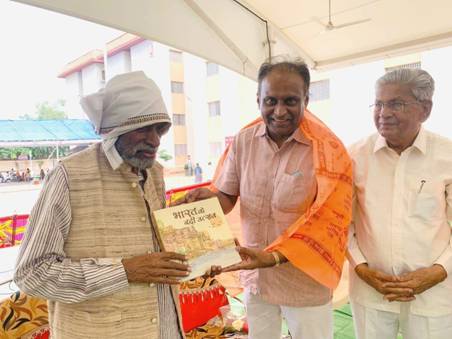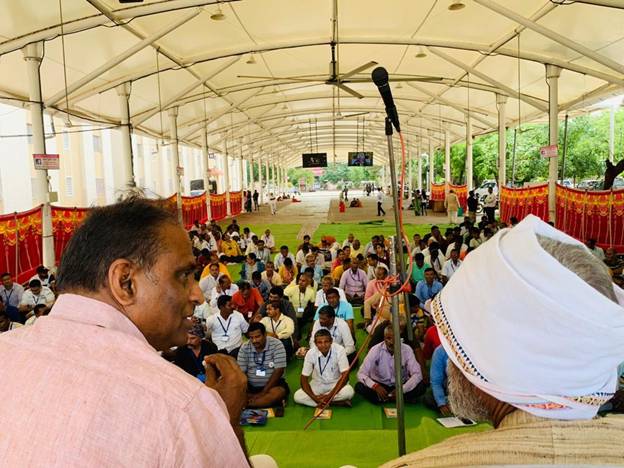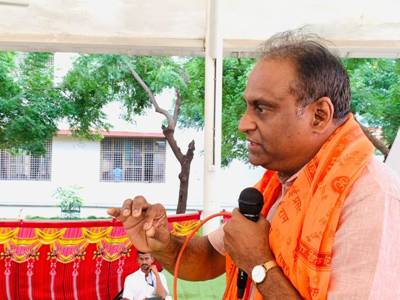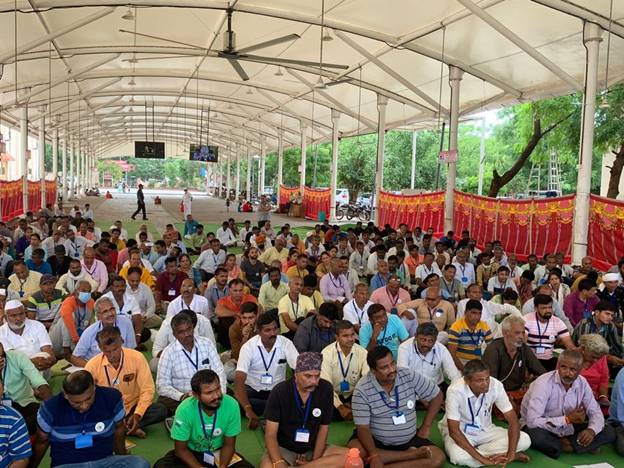Ministry of Jal Shakti
NMCG facilitates exposure visit of 30 farmers to 5-day Subhash Palekar Natural Farming workshop in Shirdi, Maharashtra
DG, NMCG participates and urges farmers to adopt Zero Budget Natural Farming under Arth Ganga campaign
Posted On:
19 AUG 2022 5:22PM by PIB Delhi
National Mission for Clean Ganga (NMCG) is facilitating the exposure visit of about 30 farmers from the Ganga Basin to the Subhash Palekar Natural Farming (SPNF) training-cum-workshop camp being organised in Shirdi, Maharashtra from 18th to 22nd August 2022. The facilitation of farmers for the workshop stems from natural farming being promoted under Namami Gange Programme to achieve the objectives of preventing the flow of contaminated water from farms into River Ganga and create a sustainable livelihood model for farmers based on natural farming under Arth Ganga initiative, espoused by the Prime Minister during the 1st National Ganga Council meeting in December 2019 in Kanpur. Natural farming is being promoted in 10 km stretch on either side of the River Ganga under this initiative.
Shri G. Asok Kumar, Director General, NMCG took part in the workshop on 18th August 2022 in the presence of Padmashree Subhash Palekar, a renowned agriculturalist who is popularly referred as ‘Krishi ka Rishi’ by the farming community. He is the promoter of ‘Zero Budget Natural Farming’ technique currently being promoted as Subhash Palekar farming across India.
One of the primary objectives of Arth Ganga is to promote Zero Budget Natural Farming that includes chemical-free farming in 10 km on either side of the river, generating ‘More Income, Per Drop’. Around 30 farmers from various districts in States on the main stem of Ganga including Uttarakhand, Uttar Pradesh, Bihar, Jharkhand and West Bengal took part in the workshop. Shri Madhav Rao Deshmukh, a leading farmer and a follower of Shri Palekar also attended the event.
The event witnessed fruitful interaction between Shri Subhash Palekar and the participating farmers. Shri Palekar talked about the significance of acknowledging the natural scheme of things and emphasized the importance of informed agricultural practices to effectively use water. Listing out some instances from his own extensive experience, he spoke about the techniques and importance of natural farming and various health benefits that could be accrued from it in the long-term. “Trust is the most important factor that one should would have to follow to be successful,” he said.
On the other hand, the curious farmers shared their experiences with the gathering and asked various questions. A farmer from Uttar Pradesh spoke about growing 35-40 varieties of crops instead of just one and develop a diversification model that increased his income manifold. Another farmer shared how his domestic ordeal turned into good business by meticulously following the natural farming techniques of Shri Subhash Palekar. He informed the gathering that he is making much more profits in his Horse Gram farming following Shri Palekar’s techniques.
The workshop also includes training and field visit of exotic fruit farms such as Dragon Fruit, exposure visits to mixed crop, banana, spices farms, training on conversion of wasteland to farmland by Natural Farming model, experience sharing on marketing of natural produce to establish a value chain free of middlemen etc.
Addressing the gathering Shri G. Asok Kumar, DG, NMCG talked about his association with ‘Maa Ganga’ from the past 3-4 years and gave an overview of how the Namami Gange Programme was envisioned by the Hon. Prime Minister in 2014 to make River Ganga Nirmal an Aviral. “Due to the flowing of dirty water from sewage and industries, River Ganga became polluted and the biodiversity, especially Ganga Dolphins started becoming extinct. In 2014, Namami Gange Programme was launched to clean River Ganga.” The positive impact of the work done under Namami Gange Programme are now showing. Some of the examples of this change are tapping the infamous Sisamau drain in Kanpur in 2019 (that discharged 14 crore liters sewage everyday into the River) and the improved water quality during Kumbh 2019. The number of sightings of Ganga Dolphins and other aquatic species in the River has increased which is the best indicator of its good health, more than any other technical parameter. “The efforts to stop the flow of more than 500 crore liters of contaminated water into River Ganga are being made and the participation of 20 crore people during Kumbh 2019 against the estimated 7 crore is a testament to the improved water quality of Ganga,” he added. He informed that 20 lakh fishes were ranched into River Ganga in the past few months at 10 locations in 5 main stem States to enhance biodiversity.
Speaking on the plans to make banks of River Ganga ‘chemical farming-mukt’, he said that NMCG is continuously striving to nudge the farmers towards natural farming to achieve the twin objectives of stopping the contaminated water from flowing into River Ganga from the fields and provide economic benefits of natural farming under the Arth Ganga campaign. “On 16th August 2022, NMCG has signed a Memorandum of Understanding (MoU) with Sahakar Bhartito form, among other objectives, a farmers’ cooperative society in every village along River Ganga and promote natural farming among the farmers,” he informed, adding, “In order to ensure sustainability of the river rejuvenation programme and increase people-river connect, various interventions are being brought in through ArthGanga initiative that aims to enhance public participation through enhanced economic activities.”
Reiterating the need for effective water management, Shri Kumar said that during his tenure at the National Water Mission, a rainwater harvesting campaign ‘Catch the Rain: Where it Falls, When it Falls’ was launched by the Hon. Prime Minister on the occasion of World Water Day on 22nd March 2021. He also spoke about the concept of water-use efficiency and cited the example of how China uses 700 litres of water while we use 3000 litres for equal amount of paddy production.
“We have to see things from the point of view water itself and not just money to achieve a water-secure future for the coming generation. Money will not ensure availability of water, but if we effectively manage our water resources in an integrated manner,it will make sure that our surface water is clean and groundwater is recharged,” he added. Shri Kumar also visited farms in Maharashtra that are promoting natural farming.
Shri Madhav Rao Deshmukh, a leading farmer from Maharashtra spoke about his mission to promote Shri Palekar’s techniques on natural farming across the country and transform it into a Jan Andolan.




***
PK
(Release ID: 1853163)
Visitor Counter : 1935